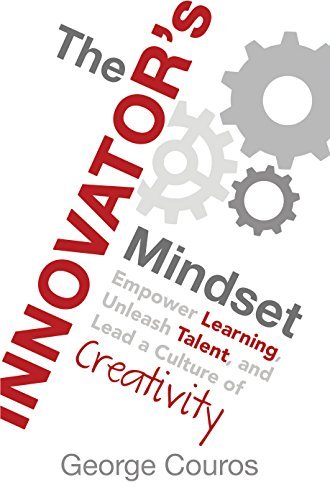
George Couros
Focusing on Changing Systems to Support Well-Being
-Not Just Implementing Wellness Initiatives)
Í fyrirlestrinum spáir hann í hvernig við getum breytt menntakerfinu þannig að fullorðnir geti þrifist og hugað að okkar líkamlegri og andlegri heilsu í stað þess að bæta alltaf við nýjum verkefnum. George talar um hvernig við setjum grímuna á okkur fyrst, af hverju það er mikilvægt og bendir á raunveruleg dæmi úr sinni reynslu bæði sem kennari og stjórnandi.
“We spend all of this money and time developing and providing mental health initiatives, yet we don’t look at the things that we do that may be contributing to the problem in the first place.”
— Unknown Author
Spurningar og svör af Sli.Do
Question 1: How can we better use the people we already have in the school when doing Professional Development? What should we be careful of?
One of the best practices we did in my school was look at the objectives that we wanted to achieve as a group, and narrowed it down to 3 or 4 goals for a 3 year cycle. Once those goals were determined, we asked people to pick the one they were most interested in leading in for others, whether it was by passion or strength, and our own staff were actually charged with delivering professional learning to one another on different days throughout the year.
This was not only beneficial to finding “home-grown” solutions to what we were trying to achieve, but it was also an opportunity to see people across the hall as the “experts” so that they felt valued by their peers. It also saved significant amounts of money that we used in other parts of the budget.
Question 2: Do school leaders give their staff reflection time? Or enough reflection time? Or the right kind of reflection time?
It is crucial to build in time within our learning days to actually reflect on our own. I do believe that we have tipped the scales to focus too much on collaboration time, but sometimes we need our own space to collect and gather our thoughts, before we come together as a group. Whether this is through extended breaks and we encourage people to reflect on their learning and then bringing back their thoughts, ideas, and actions back to the group, or by creating time and space to journal/blog within our professional learning days, there are different ways that we can create time and space to reflect.
If too much information is downloaded into our brains, it becomes useless. I would rather less information and more time to reflect on learning so that we can use looking back to moving forward.
Question 3: If we think about ourselves (teachers) as leaders in our classroom, how should we apply your ideas to our work with students?
Leadership to me is the ability to influence others to make positive moves forward in different areas. If we look at leadership in that way, do we give students the opportunity to have an impact on things that they are passionate about in the classroom and share that enthusiasm with their peers. The same is true with adults.
Leadership is not meant to be a practice that is done by one person in all areas. We move better together as a community when we develop leadership in many, and provide opportunity to share that influence with others.
Question 4: How can school leaders intervene before teachers go into burnout?
This question is really important because it is focused on a proactive, rather than reactive approach.
A few things jump out immediately.
Are we creating initiative fatigue? Are we adding things to the plate without deliberately taking things off from our staff?
Do we move onto the “new thing” before we get good at the “old thing”? Leaders need the opportunity to focus on depth rather than doing the “latest and greatest” element.
It is important to provide time for initiatives within the regular workday to complete learning. One thing that I truly believe is that if we do not provide time for new learning within our days, then it is not that important.
Encourage the importance of presence wherever you are. I think that when you are work, it is great if you are present in that space. But too often when we go home, we are still present at work, which will eventually come back to burnout. I am not a big fan of “homework” for either adults or students. We need time to have outside interests and the opportunity to spend time with others outside of our learning and work days. Treat that time as sacred.
Hver er George Couros?
George Couros hefur starfað á öllum skólastigum frá leikskóla til framhaldsskóla sem bæði kennari, upplýsingatækniráðgjafi og skólastjórnandi. Auk þess að starfa sem ráðgjafi, rithöfundur og fyrirlesari, starfar George einnig við Kennaraháskólann í Pennsylvaniu. Hann trúir því að það að skapa umhverfi og aðstæður fyrir raunverulega samvinnu við alla hlutaðeigandi í námi barna sé lykillinn að mæta þörfum barnanna best.
Hann hugsar núna mikið um bæði líkamlega og andlega heilsu eftir að hafa misst rúm 50 kg í heimsfaraldrinum 2020-22.
Hlekkir úr fyrirlestrinum:
The Fight: Self-Care vs. Systemic Change
www.mandyfroehlich.com/post/the-fight-self-care-vs-systemic-change



